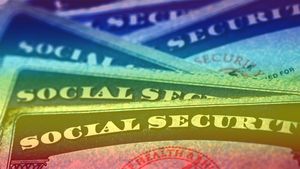
CONTACTAbout UsCAREER OPPORTUNITIESADVERTISE WITH USPRIVACY POLICYPRIVACY PREFERENCESTERMS OF USELEGAL NOTICE
© 2025 Pride Publishing Inc.
All Rights reserved
All Rights reserved
By continuing to use our site, you agree to our Private Policy and Terms of Use.
Overspending during the holiday season often leads to post-holiday blues. Here's what you can do to stop the cycle.
Buying frenzies followed by spender's remorse is a familiar feeling for many -- especially once the excitement of the holidays subsides and the credit card bills start rolling in. For those with additional impulse control issues, the problem is even more fraught.
According to the National Retail Federation's 2011 Holiday Consumer Intentions and Actions Survey, holiday shoppers said they plan to shell out an average of $704 on holiday purchases, a figure down only slightly from last year's $719. Overspending shouldn't be part of your purchasing habits, but if the deed is already done, don't despair. It's never too late to make a change. To start the new year off right, make a plan and stick to it. If you do, you're sure to find yourself in better financial shape the next time you hear jingle bells ringing. Here's how:
Make a Budget & Stick With It
Creating a budget is crucial to keeping your finances clean and your savings intact. Determine the exact amount you can spend on each item in your budget and be sure not to go over. If that's not simple enough, Google "create a budget" and you'll find plenty of online examples to use.
Remember, Cash is King
If you have trouble sticking to a budget, eliminate the temptation by leaving your credit card at home. It's easy to lose sight of how much you're spending when everything goes on plastic. Use only cash (or if you must, a debit card). This will keep you from spending money you don't have and keep you from being unpleasantly surprised when your monthly statement arrives. Remember though, some banks will let you overdraw your account with your debit card, so cash is the only true way to avoid fees.
Determine Your Needs vs. Your Wants
Is every purchase you're making a necessity? Before you buy -- stop, think, and determine if you really need the product or service, or if you merely want it. For items in the latter category, instead of buying, write them down. Keep a running list of things you want and at the end of the month, revisit the list and reward yourself for good spending habits with one or two of items on the list that you want the most.
Look at your spending habits and ask yourself whether a potential monetary outlay will fund an extravagance or a necessity. When you reframe your thinking to focus on your types of purchase -- desire and extravagance vs. need and necessity -- the equation becomes clear.
Work it Off
With each purchase you're considering, calculate how much time it'll cost you to work it off. If you realize that $200 coat means you have to work 20 more hours to pay it off, you might just reconsider the purchase.
From our Sponsors
Most Popular
31 Period Films of Lesbians and Bi Women in Love That Will Take You Back
December 09 2024 1:00 PM
18 of the most batsh*t things N.C. Republican governor candidate Mark Robinson has said
October 30 2024 11:06 AM
True
These 15 major companies caved to the far right and stopped DEI programs
January 24 2025 1:11 PM
True
Latest Stories
Decoding Trump's strange obsession with the Kennedys
March 20 2025 9:41 AM
Winter Party Festival 2025 brought dance revolution & sizzling queer heat to Miami
March 20 2025 9:00 AM
Trump admin freezes federal funds to U of Pennsylvania over transgender athletes
March 20 2025 6:00 AM
Queer Venezuelan deported and 'disappeared' over mischaracterized tattoos, lawyer says
March 19 2025 5:01 PM
Texas is quietly collecting data on trans people who legally updated their gender
March 19 2025 4:44 PM
Trump loves Betty Buckley, but the LGBTQ+ ally doesn't love him
March 19 2025 4:17 PM
Transgender service members relieved after judge blocks Trump's military ban
March 19 2025 2:29 PM
These are the 38 countries that have legalized marriage equality (in order)
March 19 2025 6:00 AM
Transgender vets deserve access to gender-affirming care, Veterans Affairs providers say (exclusive)
March 18 2025 6:29 PM
True











































































